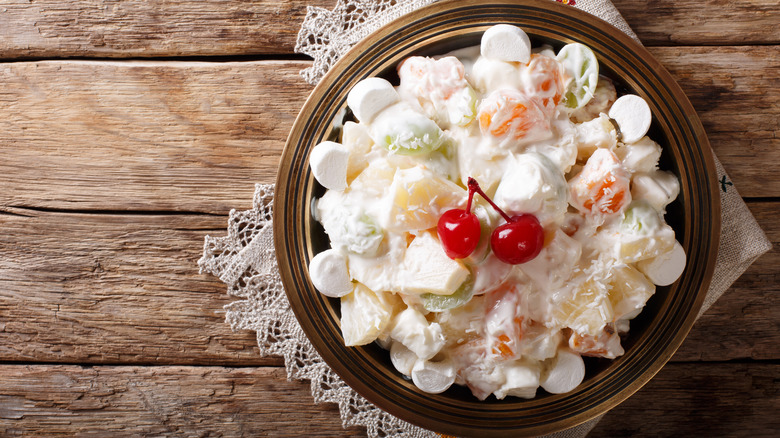The Scientific Reason Nostalgic Foods Are Making A Comeback In 2023
All of us at one point have scoured the internet for a long-ago food or beverage that simply isn't available anymore. Certain foods from our childhood fuel our hunger on both a literal and figurative level. Whether you've experienced excitement over the late rebranding of Clearly Canadian or from making a vintage dessert like your grandmother's traditional ambrosia salad, foods of the past ignite a vital feeling within us.
Nostalgia is a multi-faceted emotion that triggers four different sensations in the brain: memory, self-focused contemplation, emotional management, and positivity. As it turns out, nostalgia may be driving some of our current food choices. Based on one 2015 survey, most participants admitted to having a strong fondness for treats from the past. While we can partially blame the uptick of social media outlets like TikTok, which have made the concept of vintage foods trendy over the past few years, there is clearly more behind this inclination toward food nostalgia than we realize.
Needless to say, life in America hasn't necessarily been a walk in the park since 2020, which seems to also play a major factor in the current nostalgic food uptick; the COVID-19 pandemic, inflation, and other large-scale political events have impacted all of us both physically and emotionally. However, how is turning to a tried and true bowl of Cookie Crisp helping us in times of emotional distress? Before unpacking the scientific reasoning behind our strong desire for foods of the past, let's discuss what happens in the human brain when we lean on comfort objects or in this case, foods from our childhood.
The reason why nostalgic foods are becoming more and more popular
It turns out there's more than one reason our desire to tap into clothing, objects, and foods of the past has become more important to us now than ever before. First off, eating triggers more than one of the five senses — and in a lot of cases, it can invoke the Proust effect, the name given to a complex experience triggered by a food or scent that, in turn, ignites a past memory. (A recent 2023 study looked deeper into this, suggesting these powerful reminiscent moments have a positive impact on the human brain.)
In a 2020 interview with The New York Times, clinical psychologist Valentina Stoycheva describes the beneficial use of nostalgia amidst stressful life situations. Whether you lean on an old toy, mom's homemade ice cream, or a can of Spaghett-O's, Stoycheva explains nostalgia helps serve as an anchor for when you're feeling uneasy or dysregulated. As Stoycheva put it herself, childhood objects (and for the purposes of this piece, even food) inherently "increases your ability to self-soothe during a stressful time." Now that we understand consuming these childhood foods can actually mirror self-care during stressful times, what is it about frosted Pop-Tarts and canned sloppy-joe sauce that intrinsically add to our quality of life?
The reason nostalgic foods are coming back is actually science
While you might chuckle knowing an internet hunt for Rice Krispies Treats cereal could have a psychological grounding effect, nostalgia has an undeniable impact on the brain in more ways than one. Our engagement with products and foods from the past has transformed into multisensory experiences over time. When we look at some of the foods of the '90s that are making a resurgence — among them Good Humor's Vienetta, Doritos 3-D chips, and General Mills' Dunkaroos — we may be connecting these foods to distinct memories, which in turn, gives them varying degrees of power over our emotions.
As Susan Whitborne, a professor of brain sciences at the University of Massachusetts, told HuffPost in 2017, "Food memories feel so nostalgic because there's all this context of when you were preparing or eating this food, so the food becomes almost symbolic of other meaning." While indulging in vintage foods may unlock several layers of hidden memories, according to one 2006 study, nostalgia can also push us to be more outgoing and experience more internal positivity. In that sense, real-life stressors can (or do) provoke our steadfast desire for comfort and familiarity.
With rising prices, climate change, and fear of the unknown looming, many of us are on the lookout for new ways to cope. As it turns out, there's nothing wrong with enjoying our grandfather's beef stroganoff recipe in order to feel connected to a different time: Doing so has been proven to give us all a powerful sense of comfort and connectedness.


